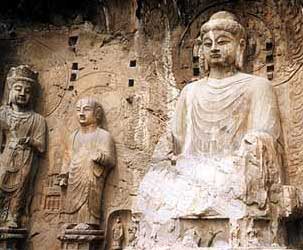Shifting desert puts Silk Road art at risk
by Michael Sheridan, The Sunday Times, November 11, 2007
Dunhuang, China -- THE shifting sands of China’s deserts – already blamed for dust clouds adding to global pollution – now threaten to bury the world’s outstanding collection of ancient Buddhist art in caves along the fabled Silk Road.
 The frescoes and statues in the renowned Dunhuang caves are being damaged by grit blown from the Kumtag desert and could be buried by the dunes, according to Wang Jiru, director of the provincial desert control institute.
The frescoes and statues in the renowned Dunhuang caves are being damaged by grit blown from the Kumtag desert and could be buried by the dunes, according to Wang Jiru, director of the provincial desert control institute.
“The desert is growing because the River Shule, which runs through the oasis, has so many dams on it that its waters are shrinking,” Wang told Xin-hua, the Chinese news agency.
The Dunhuang oasis is a treasure house of culture that contains the remains of a mysterious Buddhist civilisation that began 1,600 years ago and reached its peak in Tang dynasty China.
Related Links
Many priceless paintings and manuscripts found in the caves were carried off to the British Museum 100 years ago by Aurel Stein, the archeologist, who paid monks just £130 for the lot.
A French rival later hauled off most of what was left on behalf of the Louvre.
The dry climate has preserved many of the wall paintings and statues in a mixture of oriental and Byzantine Greek styles, a testimony to the blend of races and religions that flourished along the desert trading route from China to the West.
Their potential fate is the most striking symbol yet of the ominous encroachment of desert, which is expanding by almost 1,000 square miles a year across a swathe of northern China’s plains. More than 4,000 villages have been swallowed up.
Experts have been sounding the alarm for at least a decade, citing the rapid expansion of heavily polluted Chinese cities and the enormous numbers of animals grazing on farmland to feed their millions of inhabitants.
The livestock have stripped away grasses, leaving a crust of soil that dries and turns to dust. Falling water levels, due to uncontrolled factory operations and wells sunk for city drinking supplies, increase the erosion.
The Intergovernmental Panel on Climate Change has warned that global warming will make things worse as glaciers melt on the Tibetan plateau, reducing the reserves flowing to Chinese lakes and rivers.
The Gobi desert grew by more than 20,000 square miles in the 1990s and has crept to within 150 miles of Beijing.
The American embassy in the Chinese capital, which commissioned satellite surveillance, discovered that two deserts had merged to form one belt of sand across the provinces of Inner Mongolia and Gansu, site of the Dunhuang caves.
Another unified wasteland was coming into existence in the far west province of Xinjiang, where the Taklamakan and Kumtag deserts creep ever closer to one another.
The problem will be discussed at a global conference on climate change to be held on the Indonesian resort island of Bali next month. China will explain that in the past five years it has spent more than £4 billion to plant billions of trees and preserve grasslands.
Chinese leaders say that natural droughts are also to blame. In one sign of their desperation, officials have distributed vintage antiaircraft guns to farmers and trained them to fire shells containing silver iodide, a rain agent, into cloud formations.
Whatever the reasons, however, Chinese dust clouds have become an example of the global-isation of environmental risk. In 2002 a choking dust storm from China engulfed Seoul, the capital of South Korea, forcing the state to ground aircraft and close schools.
Satellite imagery has tracked brown miasma across Japan and chemical analysis has identified Chinese dust particles as far away as California.
Residents of Beijing itself have grown to dread the regular sand-storms from the Gobi desert, when the city disappears in a gritty haze and traffic crawls through a noontime gloom with headlights ablaze.
Lester Brown of the Earth Policy Institute was one of the first to warn of the grave social and economic consequences.
“In the deteriorating relationship between the global economy and the earth’s ecosystem, China is on the edge,” he wrote in 2003.
China has 20% of the world’s population but only 7% of its arable land. A quarter of the country is officially classified as desert. Half a million farmers have been displaced by deserti-fication and officials have tried to enforce bans on uncontrolled grazing.
Now commodity traders and economists agree that Chinese demand for food, which is soaring while agricultural land is depleted, is going to force up world prices for grain and other basic foods.
Scientists and ecologists may be pinning their hopes for change on the fact that the man at the top of the Chinese political system has no excuse for ignorance about the problem. President Hu Jintao began his career as a water expert in the now-parched Gansu province.
-----------------------
View Dunhuang treasures at the British Library's International Dunhuang Project web page
http://idp.bl.uk/

 The frescoes and statues in the renowned Dunhuang caves are being damaged by grit blown from the Kumtag desert and could be buried by the dunes, according to Wang Jiru, director of the provincial desert control institute.
The frescoes and statues in the renowned Dunhuang caves are being damaged by grit blown from the Kumtag desert and could be buried by the dunes, according to Wang Jiru, director of the provincial desert control institute.